What Does Eating Strawberries Do for Your Body: A Guide
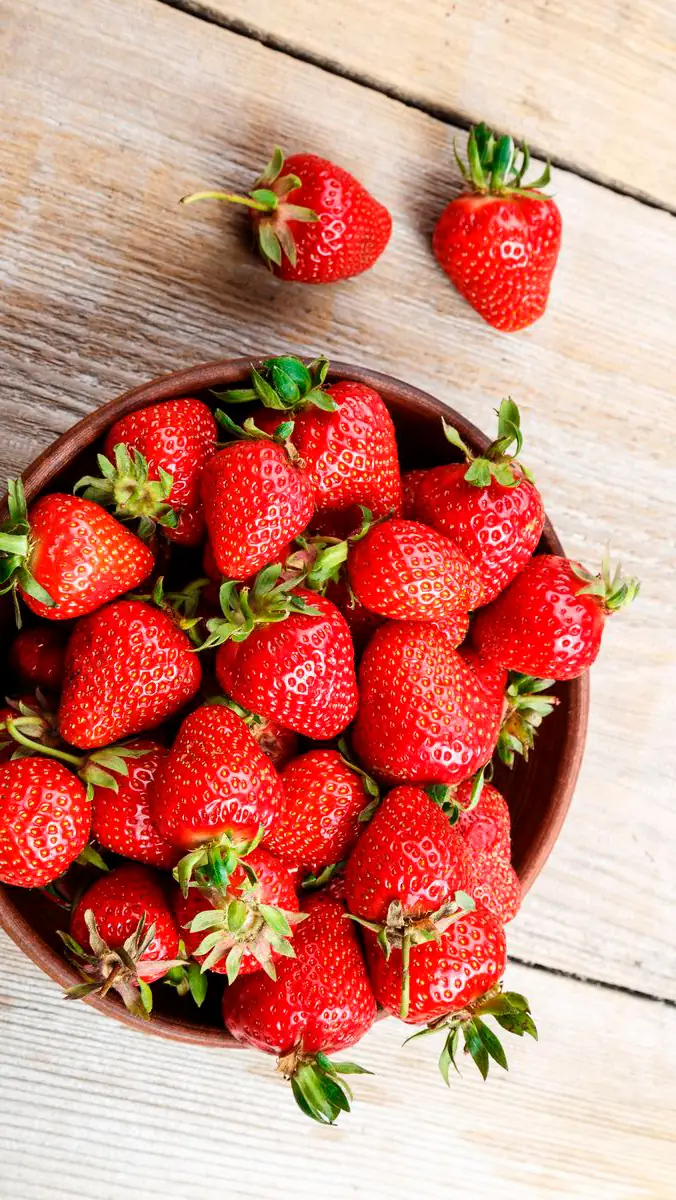
Pleasantly sweet and deliciously juicy, strawberry is popular with both children and adults. What does eating strawberries do for your body? What vitamins is this berry rich in? How can it help you slim down? How many cups of strawberry can you eat per day?
Read on to find out the answers to all these and numerous other questions.
Nutritional Value
Low in calories, strawberries are an excellent source of vitamin C, manganese, and dietary fiber.
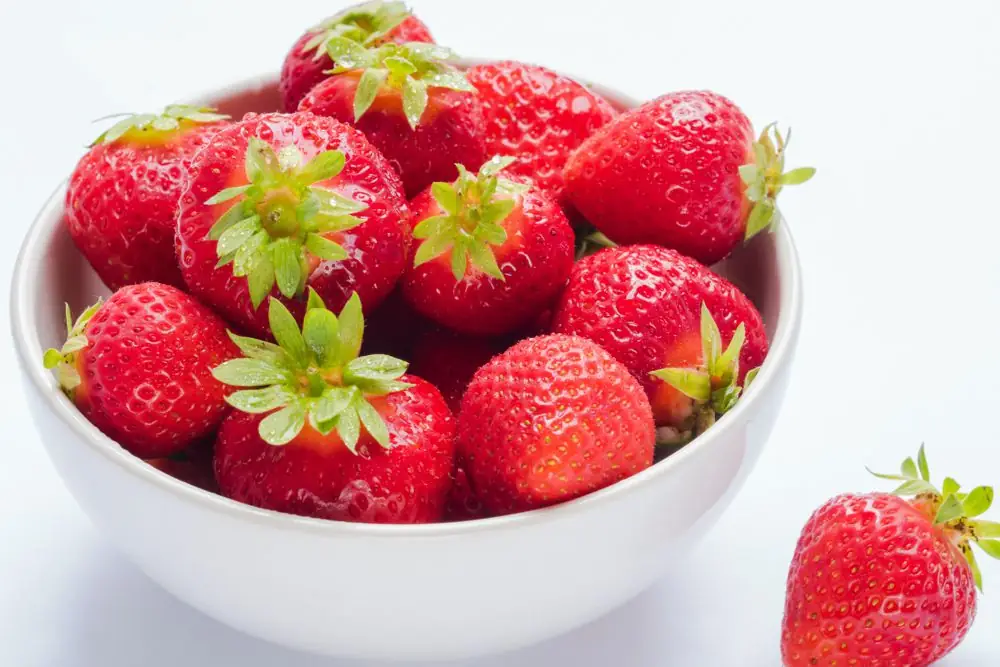
Vitamin C
Vitamin C, or ascorbic acid, is a water-soluble vitamin that serves numerous essential functions in the body:
- Stimulates immunity and reduces the duration and severity of colds;
- Acts as a potent antioxidant and protects the cells of your body from chemically active free radicals;
- Essential for skin health and collagen synthesis. Smokers are particularly prone to skin issues due to the continual depletion of ascorbic acid blood levels. If you smoke, it is strongly recommended that you increase your vitamin C consumption to maintain skin health: including vitamin C-rich foods like strawberries in your daily diet may be of great help;
- Facilitates iron absorption from plant sources. If you were diagnosed with anemia or are prone to this condition, strawberry and other foods rich in ascorbic acid are essential for your health.
There is about 149% DV (daily value) of vitamin C in a cup of strawberries cut in halves. Being healthy tastes absolutely delicious!
Manganese
Strawberry is an excellent source of dietary manganese. This essential mineral:
- Has antioxidant properties and gives you protection against free radicals;
- Required for normal bone formation;
- Essential for normal metabolism of nutrients you receive with food;
- Needed for the proper functioning of numerous enzymes.

A cup of strawberries cut in halves contains an impressive 29% DV of manganese.
Calories, Dietary Fiber and Water
Strawberry is very low in calories (only 2% DV per cup of berry halves). What’s more, it is rich in dietary fiber that is extremely important for gastrointestinal health and helps you watch your weight:
- Dietary fiber cannot be digested and slows down the rate at which sugars and cholesterol are absorbed into the bloodstream. This can be especially important if you are diagnosed with pre-diabetes, or your cholesterol levels need to be reduced.
- Dietary fiber makes you feel full for a longer time. If you want to shed pounds and limit your caloric intake, fiber rich-foods like strawberries will help you not to suffer from hunger pangs;
- Foods that are rich in dietary fiber and water (and strawberries are 91% water) make your stool heavier and bulkier. This stimulates your intestines and promotes regular bowel movements.
- Healthy bacteria in the intestine feed on dietary fiber, which in turn promotes gastrointestinal health.
- There are several studies that prove that foods rich in dietary fiber offer protection from colon cancer as well as several other types of cancer.

There are as many as 3 grams of dietary fiber (or about 12% DV) in a cup of strawberries cut in halves.
It is important to say, however, that dietary fiber is concentrated in the flesh of the berries. If, on the other hand, you drink strawberry juice, you won’t get any measurable quantities of fiber.
Other Vitamins and Dietary Minerals
While strawberries are not particularly rich in dietary minerals and vitamins other than manganese and vitamin C, they still contain measurable quantities of vitamin B9 or folate (9% DV per cup of berries cut in halves) and potassium (7% DV). Folate is extremely important for the proper function of the nervous system, while potassium is known to promote blood pressure reduction by stimulating sodium extraction and dilating blood vessels.
Bioactive Compounds
This berry is very rich in natural antioxidants, which is another reason why eating this berry is good for your health. Antioxidants are beneficial organic compounds that protect the cells of your body from the aggressive chemicals called free radicals: antioxidants help delay aging, reduce chronic inflammation, and inhibit or entirely prevent the development of heart disease, arthritis, respiratory diseases, cancer, and stroke.
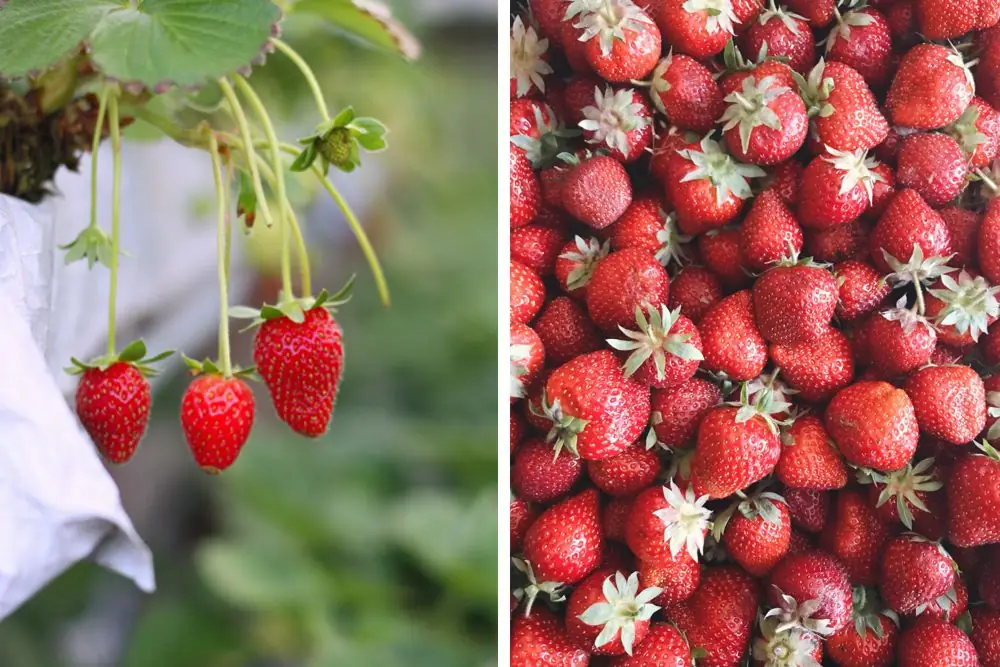
There are two main types of antioxidants in strawberry:
- Anthocyanins: in addition to their antioxidant properties, these polyphenolic compounds are believed to have anti-inflammatory, antimicrobial, and anti-carcinogenic action. It is anthocyanins that are responsible for the bright red color of strawberry.
- Ellagic acid and ellagitannins: these polyphenolic compounds are believed to protect against chronic diseases and inhibit cancer cell growth.
Do Strawberries Hydrate You?
Water makes up about 90% of strawberries, so the answer is yes, eating strawberries is an excellent way to stay hydrated. Taking into consideration that this berry is also high in dietary fiber and very low in calories, strawberry is an ideal choice for a snack if you want to both avoid hunger pangs and control your body weight.
What Does Eating Strawberries Do for You Sexually-Wise?
Thanks to Hollywood and popular culture, a combination of strawberries and whipped cream is often associated in public perception with a prelude to sex. It needs to be said, however, that while this dish tastes (and looks) absolutely fantastic, it doesn’t really have any aphrodisiac properties: so much for another urban myth.
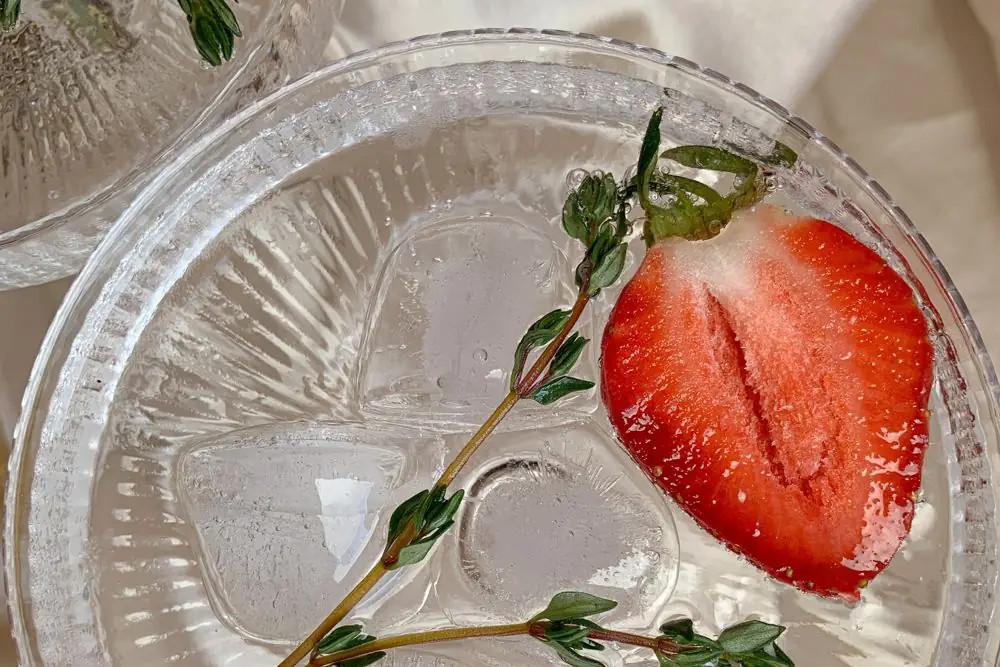
Still, there are numerous foods that do increase sexual desire. Here are the ones you can try:
- pistachio nuts
- saffron (a well-known yet expensive spice)
- chocolate
- maca
- red ginseng.
What Does Eating Strawberries Do to a Female Body?
It is a well-known fact that women are more prone to constipation than men (especially during pregnancy and right before menstruation). Luckily, eating such fiber- and water-rich food as strawberry can help women achieve regularity.
What’s more, their very high vitamin C content makes strawberries an excellent choice for all women who want to take care of their skin, prevent blemishes, and erase wrinkles.
Last but not least, strawberries contain measurable quantities of folate, which is absolutely essential for the proper development of the fetus. If you are pregnant or planning to conceive, adding strawberry to your daily menu can be a perfect idea.

What Exactly Does Strawberry Do for Your Skin?
Vitamin C (which strawberries are extremely rich in) is essential for collagen formation and skin healing. One of the very first signs of vitamin C deficiency is yellow and dry skin: to avoid this condition, you need to include in your diet such foods as strawberries, blackcurrant, bell peppers, lemons, and kiwis, to name only a few.
It also needs to be said that, as vitamin C helps your body absorb iron from plant sources, if you eat vitamin C-rich foods, you are less likely to develop anemia that often results in pale, unhealthy skin.
What’s more, as strawberries are high in water, they help your whole body — including your skin — stay hydrated, which is absolutely essential for the elimination of toxins.
Last but not least, numerous antioxidant compounds found in strawberries (anthocyanins, ellagic acid, and others) delay skin aging by protecting its cells from harmful free radicals.
What Causes Hives if You Eat Strawberries?
Spots on your skin that itch and have a pronounced red color are caused by a protein that is present in the flesh of the berry. Allergy to strawberry is a fairly common condition that is especially common in small children: if you or your children have never tasted these berries before, do not overindulge in them.
Other than hives, an allergic reaction to strawberries may include headaches, tingling on your tongue and cheeks, swelling of mucous membranes, and sometimes even breathing problems.

It is interesting to know, though, that the white (or colorless) variety of these berries does not contain allergy-causing proteins and can be freely enjoyed by people who are allergic to the regular red strawberry.
Still, if you have thyroid problems, you need to avoid all kinds of strawberries, as all of them contain goitrogens, complex organic compounds that can potentially disrupt the thyroid gland’s function in sensitive individuals.
How Many Strawberries a Day Is Healthy?
If you are not allergic to these berries, you can eat as many of them as you like (although it would definitely be a grave mistake to eat nothing but strawberries). Even if you eat as many as five cups of strawberries in a day, you will still get no more than 10% of your recommended daily caloric intake: you are extremely unlikely to gain weight if you include these berries in your daily menu.
That said, do not drink too much strawberry juice, as it almost completely lacks the dietary fiber that slows down digestion. Sugars you get from strawberry juice are very quickly absorbed into the bloodstream and can cause a blood sugar spike. Repeated spikes may lead to such conditions as chronic fatigue, heart and kidney problems, obesity, type 2 diabetes, and even nerve issues.

Why Should I Wash My Strawberries?
Conventional (i.e., non-organic) strawberries usually have a thin film of harmful pesticides on their skin. You need to thoroughly wash your berries before eating them to get rid of this pesticide residue. The good news is that most pesticides are water-soluble, so it is not very difficult to wash them off completely.
How Can I Add Strawberries to My Daily Diet?
You can enjoy these incredible berries in a number of ways:
- Use them as a healthy (and non-caloric) substitute for candy bars and ice cream;
- Slice your strawberries and add them to your fruit salads;
- Use them as a topping for your yogurt or oatmeal;
- Eat them whole as a quick — and admiringly delicious — snack;
- Add them to your smoothies.
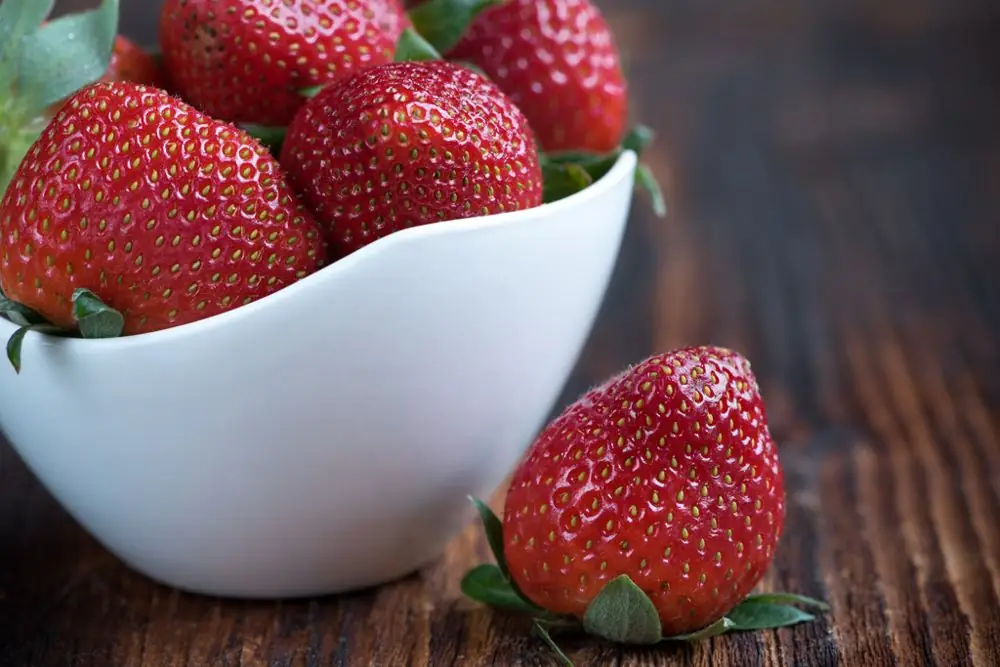
Why Eating Strawberry Is Good for Health?
Let’s sum up what good can strawberries do for your body. These berries:
- Help boost your immunity, aid collagen synthesis, improve skin health, and assist iron absorption due to their extremely high vitamin C content;
- Offer copious quantities of manganese that aid bone formation and normalize your metabolism;
- High in dietary fiber that is essential for gastrointestinal health, regulates blood sugar levels, and helps you control your body weight;
- Extremely rich in natural antioxidants (vitamin C, manganese, anthocyanins, ellagic acid) that delay aging and inhibit the development of chronic conditions, including cancer;
- Contain folate (vitamin B9), which is important for the nervous system and normal development of the fetus;
- Contain potassium that helps reduce blood pressure.
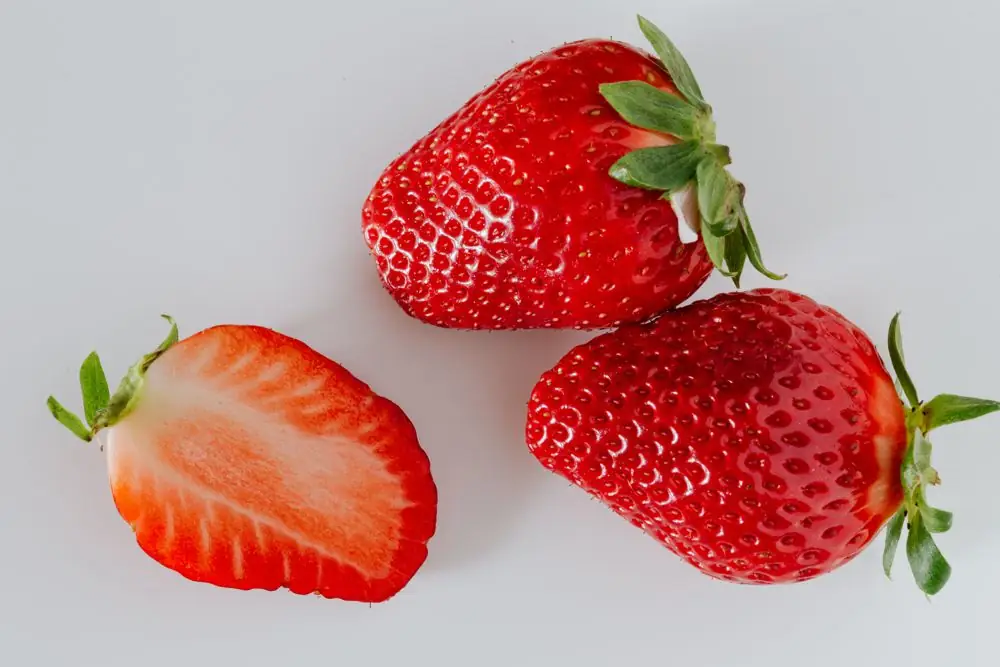
Now you know what does eating strawberries do for your body. It needs to be said, though, that neither strawberry nor any other berry or fruit is a magic bullet: to maintain good health, you need to continuously follow a balanced diet that is low in refined carbohydrates and unhealthy processed foods. It is also crucial that you keep your body well-hydrated and exercise regularly.